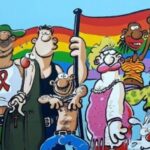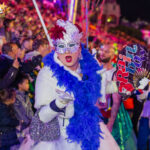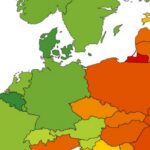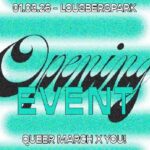When I arrived in Brussels 8 years ago, I didn’t know anybody in the city. If making friends in a new place seemed easy in my twenties, it started to become a bit challenging as I got older.
After I unpacked, I needed to do something in order to overcome this challenge. So, I joined the swimming group and the waterpolo team of Brussels Gay Sport – the association promoting sporting activities for the LGBTQI+ community.
I immediately felt welcomed and within a couple of months I had already built a network of friendships that would make my life in Brussels full of fun and good times. This happened in the framework offered by an inclusive sports association but sport is not always a welcoming and inclusive activity for LGBTQI+ people.
A long tradition of a sex segregated and gender normative activity
Throughout history, sport has been a sex segregated activity with a binary approach: male on one side and female on the other.
In Ancient Greece, the Olympic Games were a male exclusive competition with a male exclusive audience. Unmarried young females could take part in the Heraean Games which included only one activity: a race of about 160 meters. Sport was thought of as an activity for maintaining the body in good health but also a key activity for military preparation. In that sense, it was associated with virility and manhood.
When sport reemerged as an important social activity in the 19th century, it was again associated with the strength, competition and domination of men. For women, it was seen as a way to improve their body and their posture.
Women had to wait until the second edition of the Modern Olympic Games in 1900 to be able to participate in international competitions. Only 22 women participated in the Games of 1900, while almost 1,000 men took part.
In order to raise awareness about the inclusion of women in sport competition, the Women’s Olympiads and World Games were organised between the two world wars. These initiatives led to an increase in the events open to women in the Olympic Games.
However, sport was still developed as a sex-segregated and gender-normative activity. This meant that LGBTQI+ people were not openly welcomed and could even be excluded. In this context, the first cases of non-compliance with the sex binary boundaries – raised by the participation of intersex people in competitions as well as the fear of transgression of the sex-boundaries by athletes from communist countries – led to the implementation of sex verification tests for women athletes. The intention was to ensure that men weren’t able to compete in women’s events.
The first tests were implemented in 1950 by the International Association of Athletics Federation and in 1968 by the International Olympic Committee (IOC). Those tests are no longer mandatory but they can be conducted when a ‘doubt’ arises about the sex category an athlete belongs to, with sometimes tragic consequences.
Such tests led to the suicide of Indian athlete Pratina Gaonkar in 2003, after she had ‘failed’ a test. The current situation of the intersex South African athlete Caster Semenya – who is banned from competing in the 800 meters race due to testosterone levels deemed irregular – illustrates the challenges faced by intersex people in sports competition.
The sex and gender role conformity conveyed in sport also mean that transgender people can face discrimination and that individuals with diverse sexual orientations are not always welcomed in the practice of sports, especially team sports.
The LGBTQI+ community strikes back
In the 1980s, the LGBTQI+ community embraced the issue of the participation of LGBTQI+ people in sport and started to promote a new and inclusive vision for sport. Tom Waddell launched the organisation of the first Gay Olympics in San Francisco in 1982, with the idea to offer a competition open to all people, whatever their athletic abilities. Organised every four years, it has become the biggest sports event in the world, with participation higher than the Olympic games. The organisation was nevertheless sued by the IOC for the use of the world ‘Olympic’ and the event was renamed Gay Games.
The first Gay Games triggered the development of inclusive sports associations throughout the world. In Europe, the European Gay and Lesbian Sports Federation – which organises the annual Eurogames – was established in 1989. In our city of Brussels, the first LGBTQI+ sports group was launched in 1991. That first group was a volleyball team called ‘Les Coccinelles’ – The Beatles. Les Coccinelles soon developed into the multi-sport inclusive association known today as Brussels Gay Sports. BGS is now believed to be the biggest LGBTQI+ association in Belgium.
The inclusive sport associations offer a framework where LGBTQI+ people can reconnect with an activity from which they have often been excluded during their teenage years.
For me, I didn’t always feel comfortable when being part of the basketball team of my village, nor during the sport classes in school. I always found myself not fitting in. Being a member of the Brussels Mannekenfish – the inclusive local water polo team – has helped me reconcile with sport, and especially with team sport.
The experiences I’ve shared with my teammates in the pool and during international competitions have definitely made a difference in my life over the last eight years – they’ve helped me become a more confident person.
Listen to KET Talks Podcast now on Spotify, YouTube, IGTV, Deezer and Apple Podcasts! Enjoy this fourth episode of the Brussels queer podcast and feel free to give us your feedback on Facebook and Instagram.
You may also like
-

A New Safe Harbor in Brussels: RainbowHouse Launches LGBTQIA+ Info Point
RainbowHouse Brussels is opening a brand-new door for our communities – and it’s one that
-

Ten Years of Balkan LGBTQIA: A Decade of Fighting Borders, Discrimination and Silence
Created in Brussels by volunteers from across the Balkans, Balkan LGBTQIA has spent ten years
-

Queens of the South: When Nice Turns Carnival into Queer Celebration
On 27 February 2026, Place Masséna in Nice will shimmer a little brighter. Lou Queernaval,
-

Safer on Paper, Not in Reality”: ILGA Warns of Rising Anti-LGBTQIA+ Violence in Belgium
Belgium still ranks among Europe’s most protective countries for LGBTQIA+ people on paper – yet
-

“March Is for the Queers”: Why You Should Put Queer March Ghent 2026 on Your Radar
Every March, Queer March turns Ghent into a month-long celebration of queer life, resistance, and

